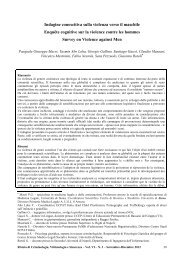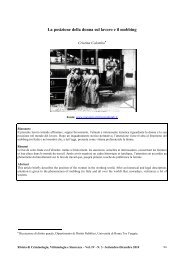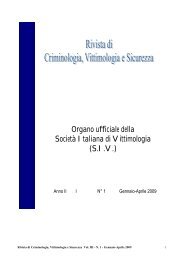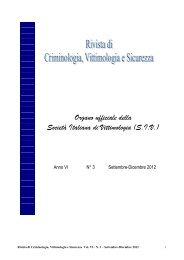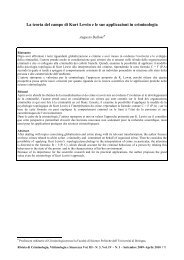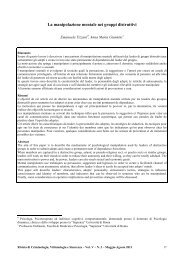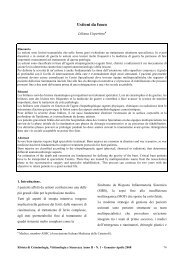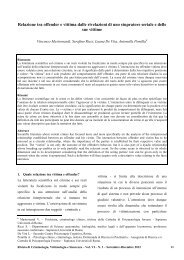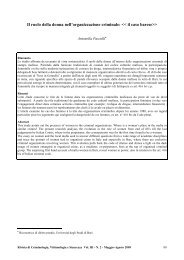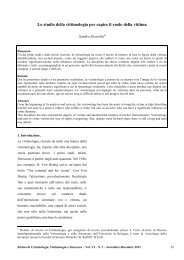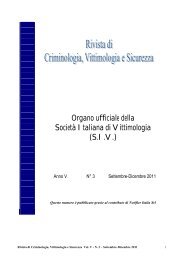Globalization, Transnational Crime and State Power ... - Vittimologia
Globalization, Transnational Crime and State Power ... - Vittimologia
Globalization, Transnational Crime and State Power ... - Vittimologia
You also want an ePaper? Increase the reach of your titles
YUMPU automatically turns print PDFs into web optimized ePapers that Google loves.
y the market in an increasingly globalizing<br />
world. We should lay a foundation for a<br />
transnational or global criminology that begins<br />
with critical underst<strong>and</strong>ings of the state, borders,<br />
<strong>and</strong> crime. I hope this paper will contribute to<br />
creating a new space for the development of<br />
useful theories, empirical investigations, <strong>and</strong> the<br />
formulation of constructive social policy<br />
regarding the phenomena labeled transnational<br />
crime <strong>and</strong> those frameworks, laws, policies, <strong>and</strong><br />
actions that are produced in response to it.<br />
We must also recognize that while state coercive<br />
powers have been increasingly globalized under<br />
the auspice of transnational crime frameworks,<br />
rights frameworks are still often territorially<br />
bounded, requiring enforcement from a particular<br />
place. In other words, international frameworks<br />
related to state power <strong>and</strong> rights have developed<br />
asymmetrically, with the result that discourses,<br />
laws, <strong>and</strong> measures related to transnational crime<br />
have significantly eroded, undermined, <strong>and</strong><br />
eclipsed the international human rights<br />
frameworks that potentially limit state power <strong>and</strong><br />
avoid or at least mitigate associated social harms.<br />
Orthodox, state-centered ways of labeling <strong>and</strong><br />
responding to troublesome transnational activities<br />
also obscure the social, political, <strong>and</strong> economic<br />
conditions that give rise to them, relieving states<br />
of the responsibility for creating <strong>and</strong> ameliorating<br />
these conditions, <strong>and</strong> thus creating a fertile<br />
context for blaming, stigmatizing, <strong>and</strong> punishing<br />
victims instead. Although transnational crime<br />
enforcement strategies are purportedly aimed at<br />
organized criminals, these countermeasures<br />
typically miss their targets altogether. Instead,<br />
they are responsible for generating a range of<br />
serious transnational social harms borne<br />
disproportionately by the world's poorest <strong>and</strong> most<br />
vulnerable people, especially refugees <strong>and</strong><br />
"illegalized" migrants. In conclusion, we now<br />
fully live in the world of the post September 11,<br />
2001 attack on the twin towers in New York; the<br />
post March 11, 2004 train bombings in Madrid,<br />
the post July 7, 2005 tube bombings in London<br />
<strong>and</strong> post other similar bombings in East Africa,<br />
Saudi Arabia, Bali, Jakarta, Mumbai <strong>and</strong> other<br />
places. The world has just begun to fully<br />
comprehend, digest <strong>and</strong> react to large scale, warlike<br />
terrorist attacks. 97 At the same time, massive<br />
shifts in wealth, manufacturing, trade <strong>and</strong> in the<br />
balance of world power are taking place <strong>and</strong><br />
center stage in our vision of the world <strong>and</strong> its<br />
dynamics. The ascendancy in the last few years<br />
especially of China <strong>and</strong> India economically,<br />
politically <strong>and</strong> also militarily, are changing the<br />
balance of wealth <strong>and</strong> power in the world. They<br />
also herald a time of sustained <strong>and</strong> increased<br />
relative prosperity there <strong>and</strong> elsewhere, hopefully<br />
<strong>and</strong> eventually for billions of people. China’s<br />
wholesale purchasing of soybeans everywhere<br />
possible has, for example, allowed many farmers<br />
in other hemispheres, especially in South<br />
America, to renovate their homes, buy the latest<br />
farm machinery, <strong>and</strong> purchase expensive goods<br />
<strong>and</strong> cars. The monopoly on wealth, information,<br />
communications, power <strong>and</strong> influence enjoyed<br />
until recently by the U.S. <strong>and</strong> the EU is now being<br />
increasingly shared with other countries in the<br />
world, until recently “underdeveloped.” Many<br />
countries previously dependent on international<br />
institutions like the World Bank, the International<br />
Monetary Fund (IMF) <strong>and</strong> others do not need<br />
97 M. Cusimano Love, “<strong>Globalization</strong>, ethics <strong>and</strong> the<br />
war on terrorism”, ND J. L. Ethics & Pub Pol'y, 2002,<br />
65<br />
Rivista di Criminologia, <strong>Vittimologia</strong> e Sicurezza Vol. III - N. 3, Vol. IV – N. 1 – Settembre 2009–Aprile 2010 84



